Organisational Behaviour Report: Waitrose, Culture, and Motivation
VerifiedAdded on 2023/01/11
|16
|4826
|89
Report
AI Summary
This report delves into the intricacies of organisational behaviour, using Waitrose as a case study to illustrate key concepts. It examines how organisational culture, power dynamics, and political influences shape individual and team performance. The report explores the impact of various power structures, including coercive, reward, and expert power, and analyzes how Handy's cultural typology (power, role, person, and task cultures) can be applied to foster a healthy work environment. Furthermore, the report evaluates content and process theories of motivation, such as Maslow's hierarchy of needs, Herzberg's two-factor theory, and Vroom's expectancy theory, demonstrating how these theories can be employed to enhance employee motivation and facilitate the achievement of organisational goals. The report also differentiates between effective and ineffective teams, offering insights into the components that contribute to team success. Finally, the report provides a critique of the influence of organisational components on individual and team behaviour, offering a comprehensive understanding of organisational behaviour principles.
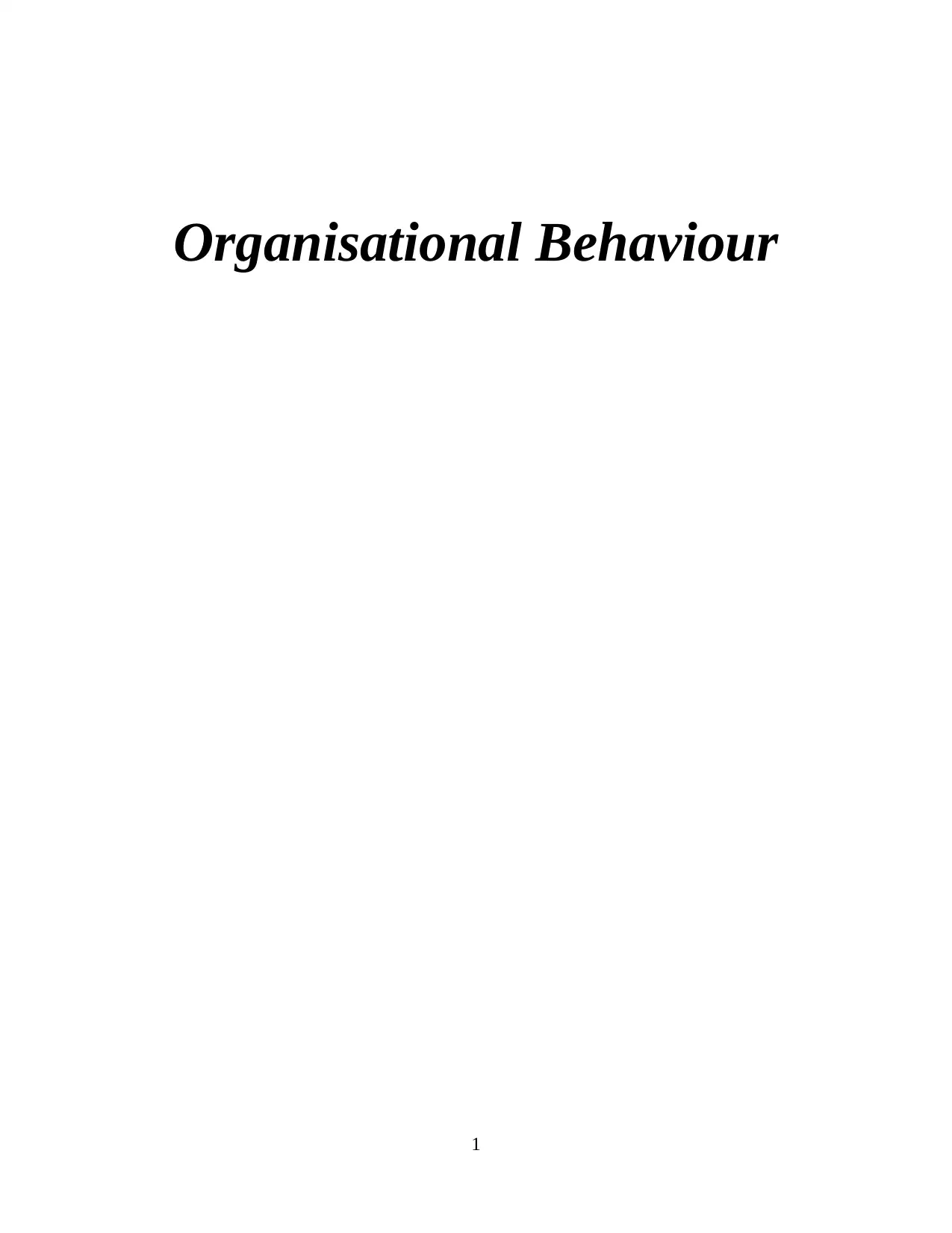
Organisational Behaviour
1
1
Paraphrase This Document
Need a fresh take? Get an instant paraphrase of this document with our AI Paraphraser
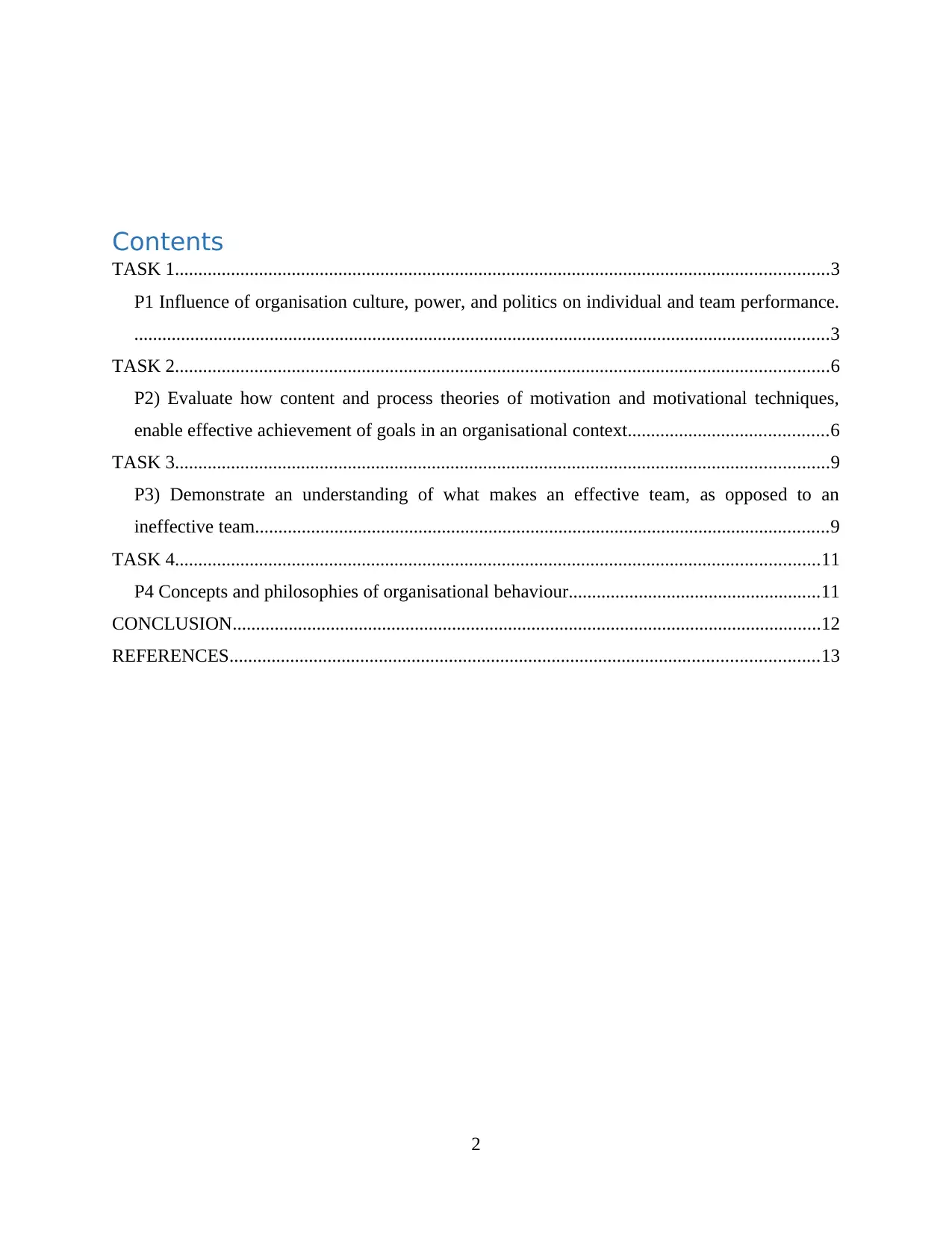
Contents
TASK 1............................................................................................................................................3
P1 Influence of organisation culture, power, and politics on individual and team performance.
.....................................................................................................................................................3
TASK 2............................................................................................................................................6
P2) Evaluate how content and process theories of motivation and motivational techniques,
enable effective achievement of goals in an organisational context...........................................6
TASK 3............................................................................................................................................9
P3) Demonstrate an understanding of what makes an effective team, as opposed to an
ineffective team...........................................................................................................................9
TASK 4..........................................................................................................................................11
P4 Concepts and philosophies of organisational behaviour......................................................11
CONCLUSION..............................................................................................................................12
REFERENCES..............................................................................................................................13
2
TASK 1............................................................................................................................................3
P1 Influence of organisation culture, power, and politics on individual and team performance.
.....................................................................................................................................................3
TASK 2............................................................................................................................................6
P2) Evaluate how content and process theories of motivation and motivational techniques,
enable effective achievement of goals in an organisational context...........................................6
TASK 3............................................................................................................................................9
P3) Demonstrate an understanding of what makes an effective team, as opposed to an
ineffective team...........................................................................................................................9
TASK 4..........................................................................................................................................11
P4 Concepts and philosophies of organisational behaviour......................................................11
CONCLUSION..............................................................................................................................12
REFERENCES..............................................................................................................................13
2
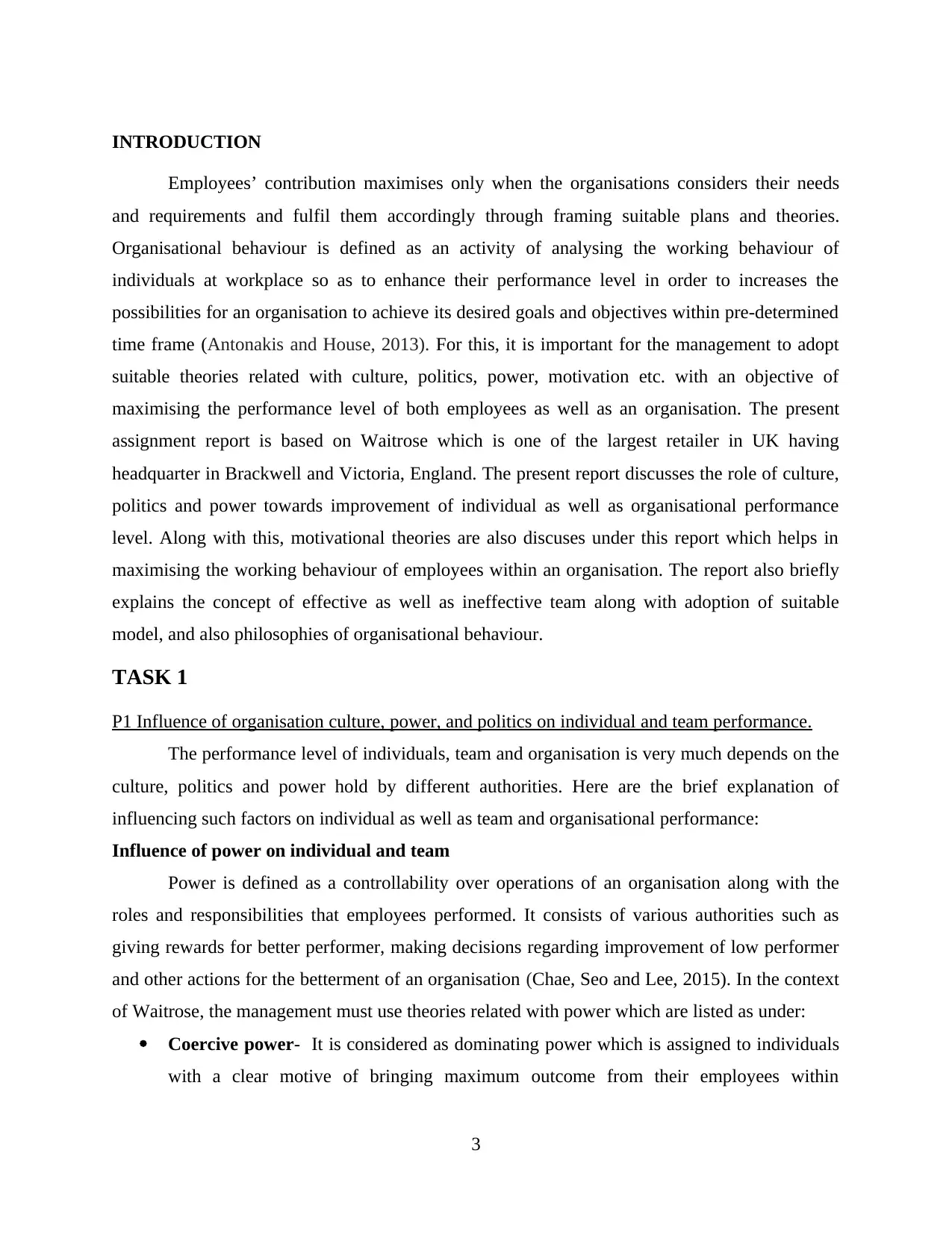
INTRODUCTION
Employees’ contribution maximises only when the organisations considers their needs
and requirements and fulfil them accordingly through framing suitable plans and theories.
Organisational behaviour is defined as an activity of analysing the working behaviour of
individuals at workplace so as to enhance their performance level in order to increases the
possibilities for an organisation to achieve its desired goals and objectives within pre-determined
time frame (Antonakis and House, 2013). For this, it is important for the management to adopt
suitable theories related with culture, politics, power, motivation etc. with an objective of
maximising the performance level of both employees as well as an organisation. The present
assignment report is based on Waitrose which is one of the largest retailer in UK having
headquarter in Brackwell and Victoria, England. The present report discusses the role of culture,
politics and power towards improvement of individual as well as organisational performance
level. Along with this, motivational theories are also discuses under this report which helps in
maximising the working behaviour of employees within an organisation. The report also briefly
explains the concept of effective as well as ineffective team along with adoption of suitable
model, and also philosophies of organisational behaviour.
TASK 1
P1 Influence of organisation culture, power, and politics on individual and team performance.
The performance level of individuals, team and organisation is very much depends on the
culture, politics and power hold by different authorities. Here are the brief explanation of
influencing such factors on individual as well as team and organisational performance:
Influence of power on individual and team
Power is defined as a controllability over operations of an organisation along with the
roles and responsibilities that employees performed. It consists of various authorities such as
giving rewards for better performer, making decisions regarding improvement of low performer
and other actions for the betterment of an organisation (Chae, Seo and Lee, 2015). In the context
of Waitrose, the management must use theories related with power which are listed as under:
Coercive power- It is considered as dominating power which is assigned to individuals
with a clear motive of bringing maximum outcome from their employees within
3
Employees’ contribution maximises only when the organisations considers their needs
and requirements and fulfil them accordingly through framing suitable plans and theories.
Organisational behaviour is defined as an activity of analysing the working behaviour of
individuals at workplace so as to enhance their performance level in order to increases the
possibilities for an organisation to achieve its desired goals and objectives within pre-determined
time frame (Antonakis and House, 2013). For this, it is important for the management to adopt
suitable theories related with culture, politics, power, motivation etc. with an objective of
maximising the performance level of both employees as well as an organisation. The present
assignment report is based on Waitrose which is one of the largest retailer in UK having
headquarter in Brackwell and Victoria, England. The present report discusses the role of culture,
politics and power towards improvement of individual as well as organisational performance
level. Along with this, motivational theories are also discuses under this report which helps in
maximising the working behaviour of employees within an organisation. The report also briefly
explains the concept of effective as well as ineffective team along with adoption of suitable
model, and also philosophies of organisational behaviour.
TASK 1
P1 Influence of organisation culture, power, and politics on individual and team performance.
The performance level of individuals, team and organisation is very much depends on the
culture, politics and power hold by different authorities. Here are the brief explanation of
influencing such factors on individual as well as team and organisational performance:
Influence of power on individual and team
Power is defined as a controllability over operations of an organisation along with the
roles and responsibilities that employees performed. It consists of various authorities such as
giving rewards for better performer, making decisions regarding improvement of low performer
and other actions for the betterment of an organisation (Chae, Seo and Lee, 2015). In the context
of Waitrose, the management must use theories related with power which are listed as under:
Coercive power- It is considered as dominating power which is assigned to individuals
with a clear motive of bringing maximum outcome from their employees within
3
⊘ This is a preview!⊘
Do you want full access?
Subscribe today to unlock all pages.

Trusted by 1+ million students worldwide
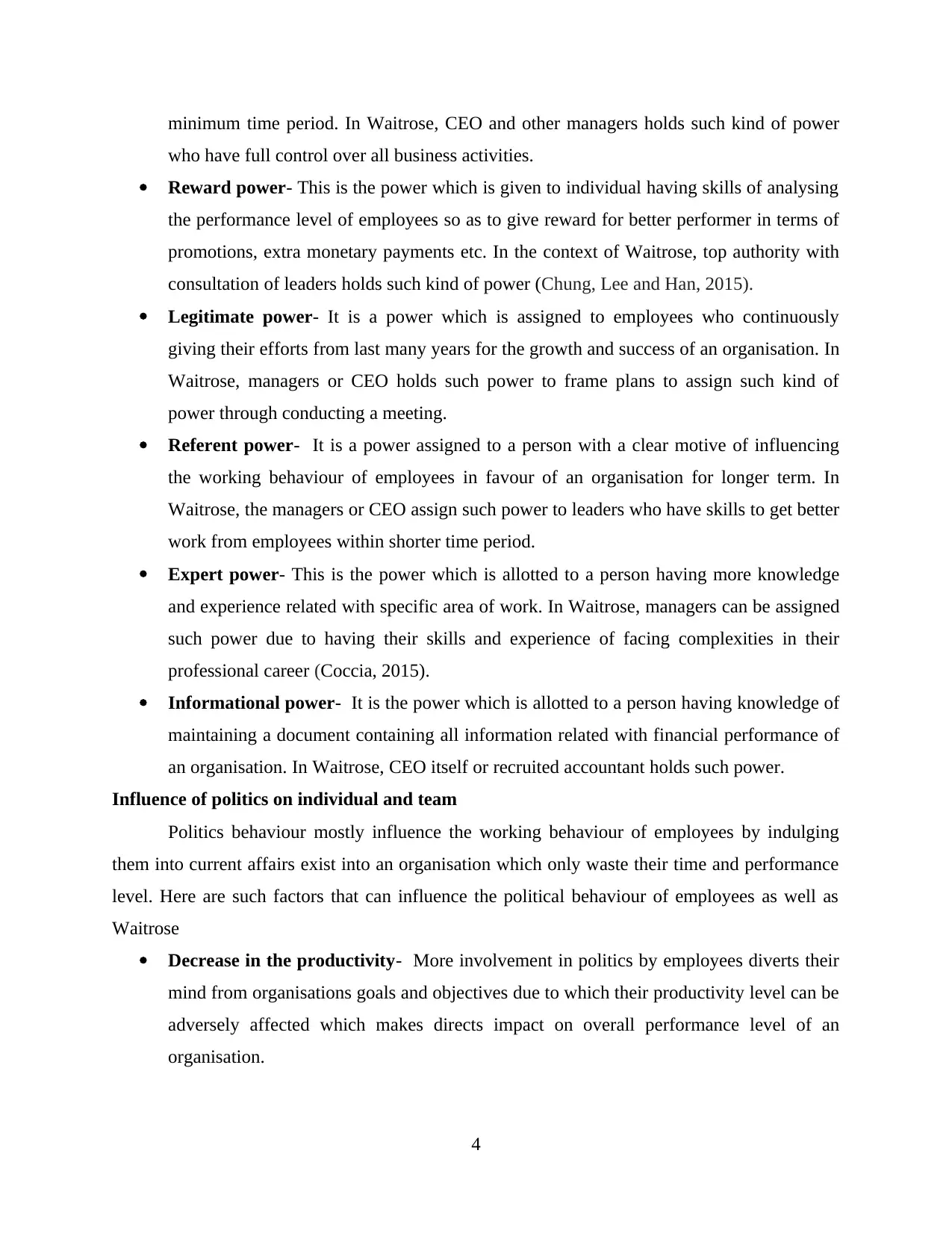
minimum time period. In Waitrose, CEO and other managers holds such kind of power
who have full control over all business activities.
Reward power- This is the power which is given to individual having skills of analysing
the performance level of employees so as to give reward for better performer in terms of
promotions, extra monetary payments etc. In the context of Waitrose, top authority with
consultation of leaders holds such kind of power (Chung, Lee and Han, 2015).
Legitimate power- It is a power which is assigned to employees who continuously
giving their efforts from last many years for the growth and success of an organisation. In
Waitrose, managers or CEO holds such power to frame plans to assign such kind of
power through conducting a meeting.
Referent power- It is a power assigned to a person with a clear motive of influencing
the working behaviour of employees in favour of an organisation for longer term. In
Waitrose, the managers or CEO assign such power to leaders who have skills to get better
work from employees within shorter time period.
Expert power- This is the power which is allotted to a person having more knowledge
and experience related with specific area of work. In Waitrose, managers can be assigned
such power due to having their skills and experience of facing complexities in their
professional career (Coccia, 2015).
Informational power- It is the power which is allotted to a person having knowledge of
maintaining a document containing all information related with financial performance of
an organisation. In Waitrose, CEO itself or recruited accountant holds such power.
Influence of politics on individual and team
Politics behaviour mostly influence the working behaviour of employees by indulging
them into current affairs exist into an organisation which only waste their time and performance
level. Here are such factors that can influence the political behaviour of employees as well as
Waitrose
Decrease in the productivity- More involvement in politics by employees diverts their
mind from organisations goals and objectives due to which their productivity level can be
adversely affected which makes directs impact on overall performance level of an
organisation.
4
who have full control over all business activities.
Reward power- This is the power which is given to individual having skills of analysing
the performance level of employees so as to give reward for better performer in terms of
promotions, extra monetary payments etc. In the context of Waitrose, top authority with
consultation of leaders holds such kind of power (Chung, Lee and Han, 2015).
Legitimate power- It is a power which is assigned to employees who continuously
giving their efforts from last many years for the growth and success of an organisation. In
Waitrose, managers or CEO holds such power to frame plans to assign such kind of
power through conducting a meeting.
Referent power- It is a power assigned to a person with a clear motive of influencing
the working behaviour of employees in favour of an organisation for longer term. In
Waitrose, the managers or CEO assign such power to leaders who have skills to get better
work from employees within shorter time period.
Expert power- This is the power which is allotted to a person having more knowledge
and experience related with specific area of work. In Waitrose, managers can be assigned
such power due to having their skills and experience of facing complexities in their
professional career (Coccia, 2015).
Informational power- It is the power which is allotted to a person having knowledge of
maintaining a document containing all information related with financial performance of
an organisation. In Waitrose, CEO itself or recruited accountant holds such power.
Influence of politics on individual and team
Politics behaviour mostly influence the working behaviour of employees by indulging
them into current affairs exist into an organisation which only waste their time and performance
level. Here are such factors that can influence the political behaviour of employees as well as
Waitrose
Decrease in the productivity- More involvement in politics by employees diverts their
mind from organisations goals and objectives due to which their productivity level can be
adversely affected which makes directs impact on overall performance level of an
organisation.
4
Paraphrase This Document
Need a fresh take? Get an instant paraphrase of this document with our AI Paraphraser
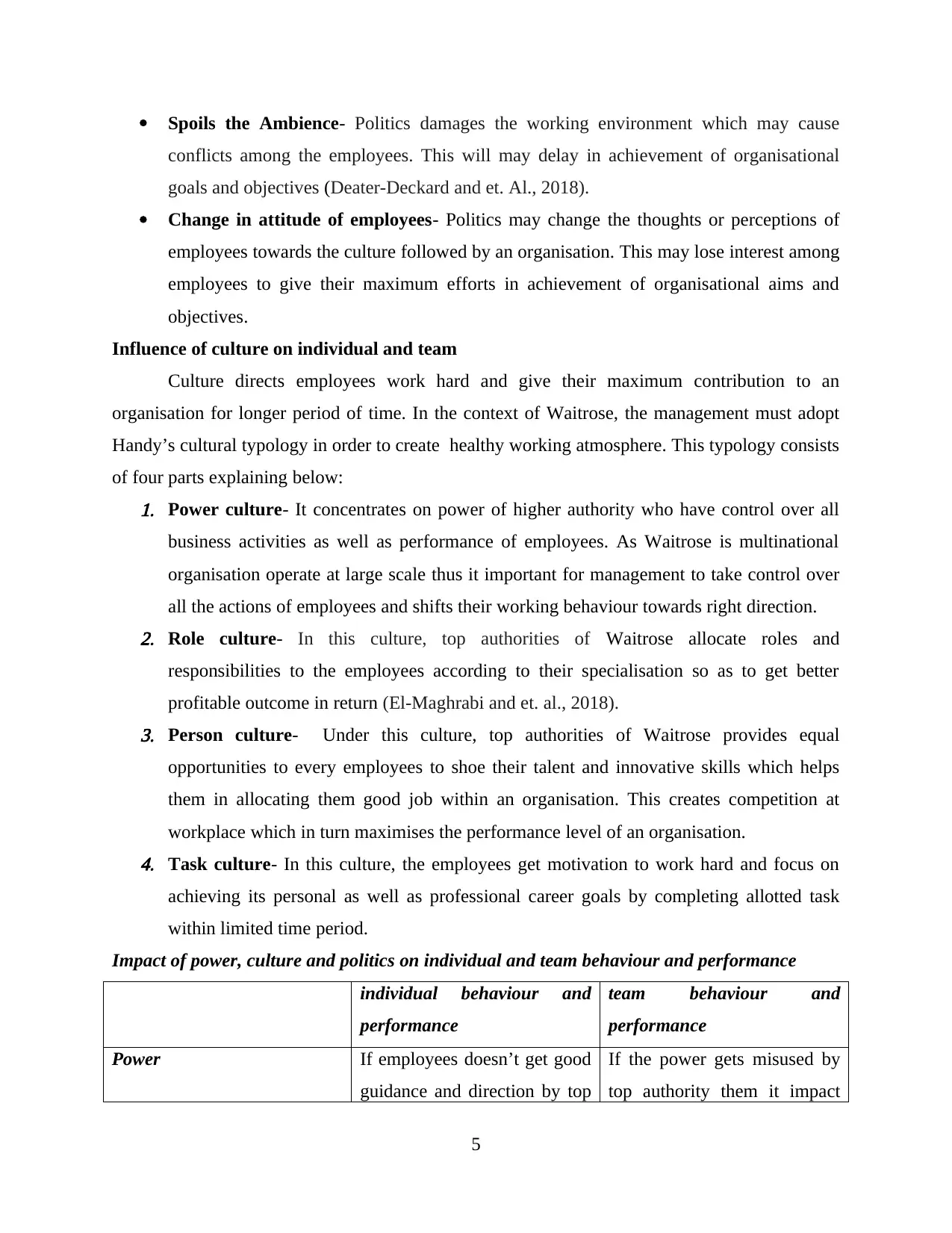
Spoils the Ambience- Politics damages the working environment which may cause
conflicts among the employees. This will may delay in achievement of organisational
goals and objectives (Deater-Deckard and et. Al., 2018).
Change in attitude of employees- Politics may change the thoughts or perceptions of
employees towards the culture followed by an organisation. This may lose interest among
employees to give their maximum efforts in achievement of organisational aims and
objectives.
Influence of culture on individual and team
Culture directs employees work hard and give their maximum contribution to an
organisation for longer period of time. In the context of Waitrose, the management must adopt
Handy’s cultural typology in order to create healthy working atmosphere. This typology consists
of four parts explaining below:1. Power culture- It concentrates on power of higher authority who have control over all
business activities as well as performance of employees. As Waitrose is multinational
organisation operate at large scale thus it important for management to take control over
all the actions of employees and shifts their working behaviour towards right direction.2. Role culture- In this culture, top authorities of Waitrose allocate roles and
responsibilities to the employees according to their specialisation so as to get better
profitable outcome in return (El-Maghrabi and et. al., 2018).3. Person culture- Under this culture, top authorities of Waitrose provides equal
opportunities to every employees to shoe their talent and innovative skills which helps
them in allocating them good job within an organisation. This creates competition at
workplace which in turn maximises the performance level of an organisation.4. Task culture- In this culture, the employees get motivation to work hard and focus on
achieving its personal as well as professional career goals by completing allotted task
within limited time period.
Impact of power, culture and politics on individual and team behaviour and performance
individual behaviour and
performance
team behaviour and
performance
Power If employees doesn’t get good
guidance and direction by top
If the power gets misused by
top authority them it impact
5
conflicts among the employees. This will may delay in achievement of organisational
goals and objectives (Deater-Deckard and et. Al., 2018).
Change in attitude of employees- Politics may change the thoughts or perceptions of
employees towards the culture followed by an organisation. This may lose interest among
employees to give their maximum efforts in achievement of organisational aims and
objectives.
Influence of culture on individual and team
Culture directs employees work hard and give their maximum contribution to an
organisation for longer period of time. In the context of Waitrose, the management must adopt
Handy’s cultural typology in order to create healthy working atmosphere. This typology consists
of four parts explaining below:1. Power culture- It concentrates on power of higher authority who have control over all
business activities as well as performance of employees. As Waitrose is multinational
organisation operate at large scale thus it important for management to take control over
all the actions of employees and shifts their working behaviour towards right direction.2. Role culture- In this culture, top authorities of Waitrose allocate roles and
responsibilities to the employees according to their specialisation so as to get better
profitable outcome in return (El-Maghrabi and et. al., 2018).3. Person culture- Under this culture, top authorities of Waitrose provides equal
opportunities to every employees to shoe their talent and innovative skills which helps
them in allocating them good job within an organisation. This creates competition at
workplace which in turn maximises the performance level of an organisation.4. Task culture- In this culture, the employees get motivation to work hard and focus on
achieving its personal as well as professional career goals by completing allotted task
within limited time period.
Impact of power, culture and politics on individual and team behaviour and performance
individual behaviour and
performance
team behaviour and
performance
Power If employees doesn’t get good
guidance and direction by top
If the power gets misused by
top authority them it impact
5
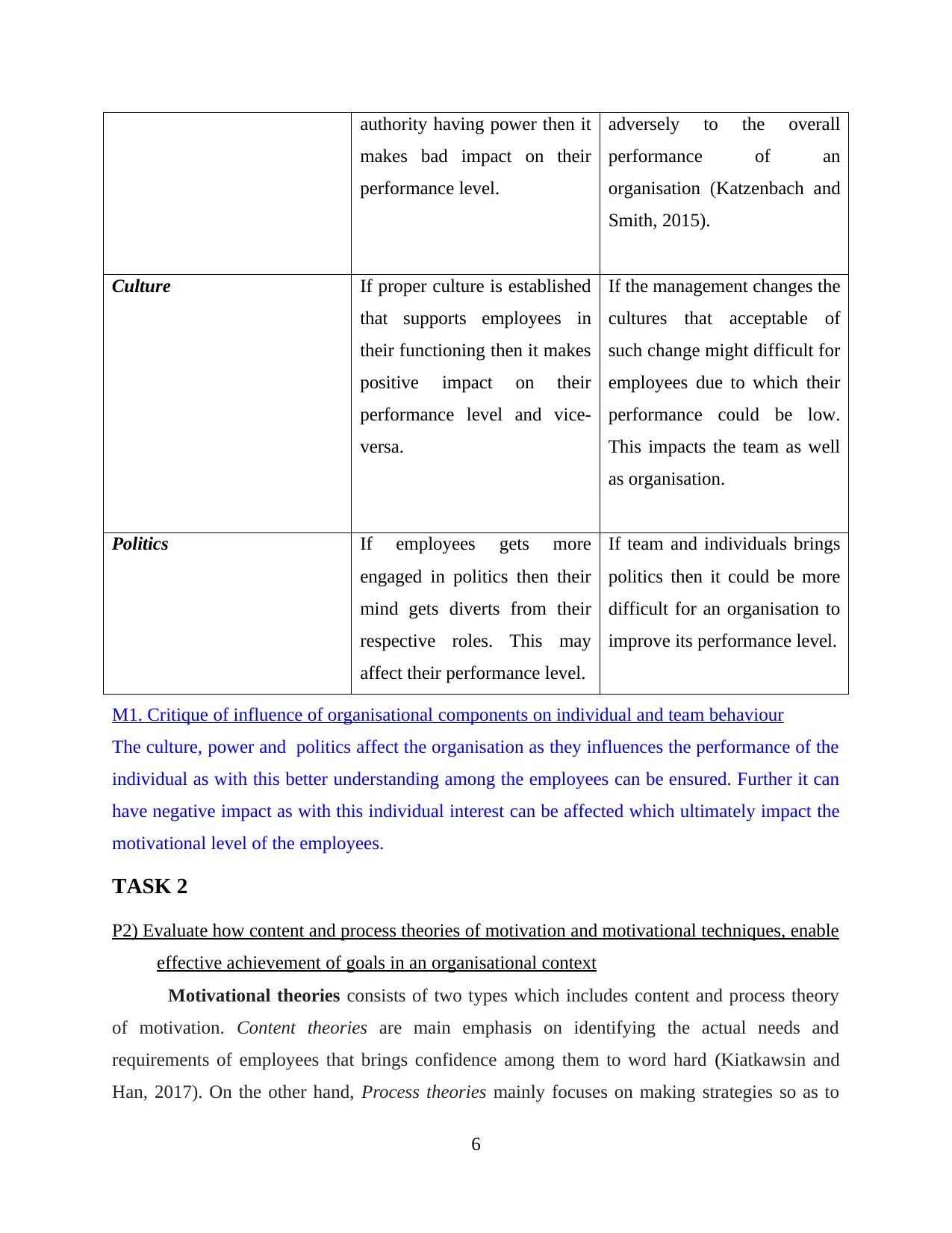
authority having power then it
makes bad impact on their
performance level.
adversely to the overall
performance of an
organisation (Katzenbach and
Smith, 2015).
Culture If proper culture is established
that supports employees in
their functioning then it makes
positive impact on their
performance level and vice-
versa.
If the management changes the
cultures that acceptable of
such change might difficult for
employees due to which their
performance could be low.
This impacts the team as well
as organisation.
Politics If employees gets more
engaged in politics then their
mind gets diverts from their
respective roles. This may
affect their performance level.
If team and individuals brings
politics then it could be more
difficult for an organisation to
improve its performance level.
M1. Critique of influence of organisational components on individual and team behaviour
The culture, power and politics affect the organisation as they influences the performance of the
individual as with this better understanding among the employees can be ensured. Further it can
have negative impact as with this individual interest can be affected which ultimately impact the
motivational level of the employees.
TASK 2
P2) Evaluate how content and process theories of motivation and motivational techniques, enable
effective achievement of goals in an organisational context
Motivational theories consists of two types which includes content and process theory
of motivation. Content theories are main emphasis on identifying the actual needs and
requirements of employees that brings confidence among them to word hard (Kiatkawsin and
Han, 2017). On the other hand, Process theories mainly focuses on making strategies so as to
6
makes bad impact on their
performance level.
adversely to the overall
performance of an
organisation (Katzenbach and
Smith, 2015).
Culture If proper culture is established
that supports employees in
their functioning then it makes
positive impact on their
performance level and vice-
versa.
If the management changes the
cultures that acceptable of
such change might difficult for
employees due to which their
performance could be low.
This impacts the team as well
as organisation.
Politics If employees gets more
engaged in politics then their
mind gets diverts from their
respective roles. This may
affect their performance level.
If team and individuals brings
politics then it could be more
difficult for an organisation to
improve its performance level.
M1. Critique of influence of organisational components on individual and team behaviour
The culture, power and politics affect the organisation as they influences the performance of the
individual as with this better understanding among the employees can be ensured. Further it can
have negative impact as with this individual interest can be affected which ultimately impact the
motivational level of the employees.
TASK 2
P2) Evaluate how content and process theories of motivation and motivational techniques, enable
effective achievement of goals in an organisational context
Motivational theories consists of two types which includes content and process theory
of motivation. Content theories are main emphasis on identifying the actual needs and
requirements of employees that brings confidence among them to word hard (Kiatkawsin and
Han, 2017). On the other hand, Process theories mainly focuses on making strategies so as to
6
⊘ This is a preview!⊘
Do you want full access?
Subscribe today to unlock all pages.

Trusted by 1+ million students worldwide
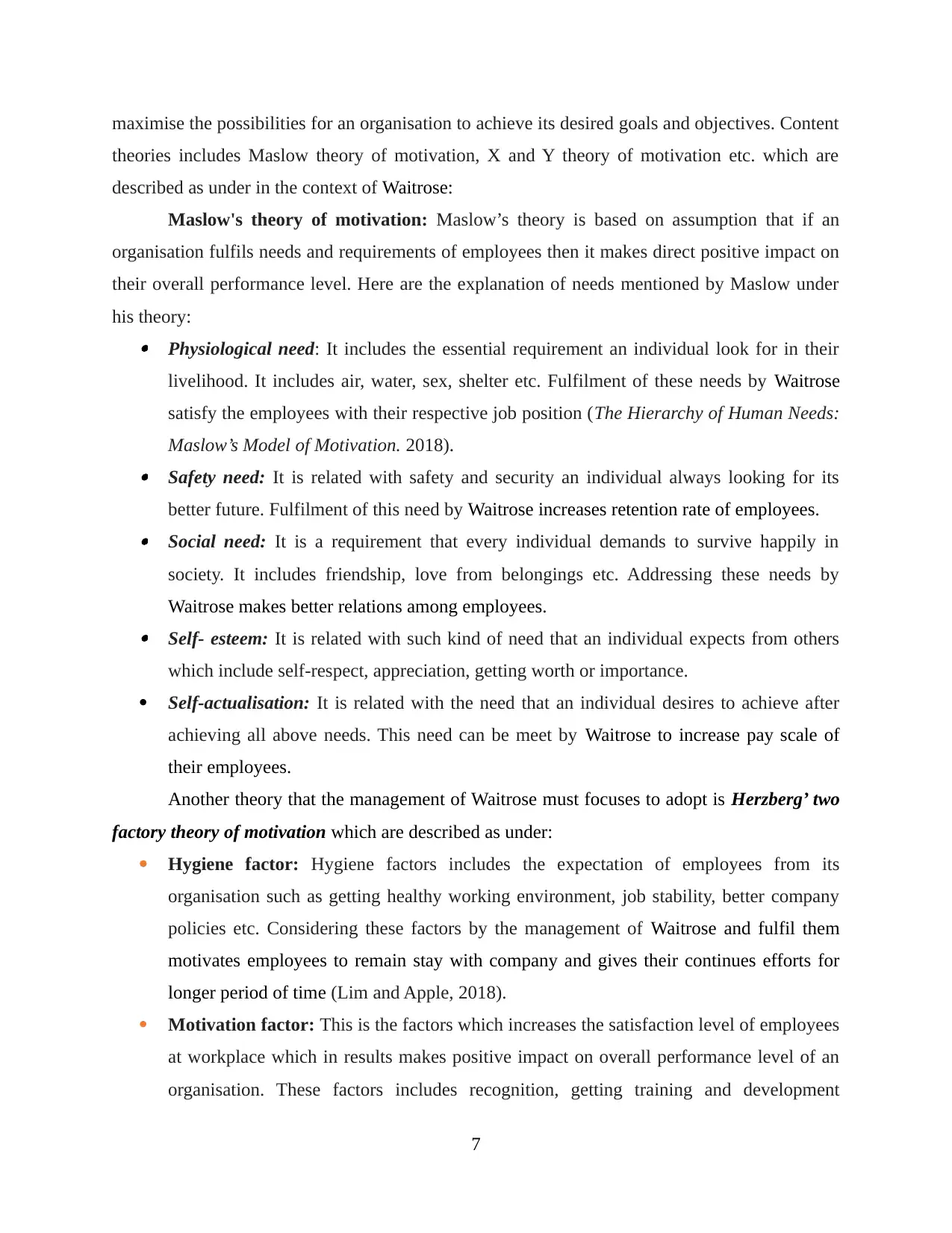
maximise the possibilities for an organisation to achieve its desired goals and objectives. Content
theories includes Maslow theory of motivation, X and Y theory of motivation etc. which are
described as under in the context of Waitrose:
Maslow's theory of motivation: Maslow’s theory is based on assumption that if an
organisation fulfils needs and requirements of employees then it makes direct positive impact on
their overall performance level. Here are the explanation of needs mentioned by Maslow under
his theory: Physiological need: It includes the essential requirement an individual look for in their
livelihood. It includes air, water, sex, shelter etc. Fulfilment of these needs by Waitrose
satisfy the employees with their respective job position (The Hierarchy of Human Needs:
Maslow’s Model of Motivation. 2018). Safety need: It is related with safety and security an individual always looking for its
better future. Fulfilment of this need by Waitrose increases retention rate of employees. Social need: It is a requirement that every individual demands to survive happily in
society. It includes friendship, love from belongings etc. Addressing these needs by
Waitrose makes better relations among employees. Self- esteem: It is related with such kind of need that an individual expects from others
which include self-respect, appreciation, getting worth or importance.
Self-actualisation: It is related with the need that an individual desires to achieve after
achieving all above needs. This need can be meet by Waitrose to increase pay scale of
their employees.
Another theory that the management of Waitrose must focuses to adopt is Herzberg’ two
factory theory of motivation which are described as under:
Hygiene factor: Hygiene factors includes the expectation of employees from its
organisation such as getting healthy working environment, job stability, better company
policies etc. Considering these factors by the management of Waitrose and fulfil them
motivates employees to remain stay with company and gives their continues efforts for
longer period of time (Lim and Apple, 2018).
Motivation factor: This is the factors which increases the satisfaction level of employees
at workplace which in results makes positive impact on overall performance level of an
organisation. These factors includes recognition, getting training and development
7
theories includes Maslow theory of motivation, X and Y theory of motivation etc. which are
described as under in the context of Waitrose:
Maslow's theory of motivation: Maslow’s theory is based on assumption that if an
organisation fulfils needs and requirements of employees then it makes direct positive impact on
their overall performance level. Here are the explanation of needs mentioned by Maslow under
his theory: Physiological need: It includes the essential requirement an individual look for in their
livelihood. It includes air, water, sex, shelter etc. Fulfilment of these needs by Waitrose
satisfy the employees with their respective job position (The Hierarchy of Human Needs:
Maslow’s Model of Motivation. 2018). Safety need: It is related with safety and security an individual always looking for its
better future. Fulfilment of this need by Waitrose increases retention rate of employees. Social need: It is a requirement that every individual demands to survive happily in
society. It includes friendship, love from belongings etc. Addressing these needs by
Waitrose makes better relations among employees. Self- esteem: It is related with such kind of need that an individual expects from others
which include self-respect, appreciation, getting worth or importance.
Self-actualisation: It is related with the need that an individual desires to achieve after
achieving all above needs. This need can be meet by Waitrose to increase pay scale of
their employees.
Another theory that the management of Waitrose must focuses to adopt is Herzberg’ two
factory theory of motivation which are described as under:
Hygiene factor: Hygiene factors includes the expectation of employees from its
organisation such as getting healthy working environment, job stability, better company
policies etc. Considering these factors by the management of Waitrose and fulfil them
motivates employees to remain stay with company and gives their continues efforts for
longer period of time (Lim and Apple, 2018).
Motivation factor: This is the factors which increases the satisfaction level of employees
at workplace which in results makes positive impact on overall performance level of an
organisation. These factors includes recognition, getting training and development
7
Paraphrase This Document
Need a fresh take? Get an instant paraphrase of this document with our AI Paraphraser
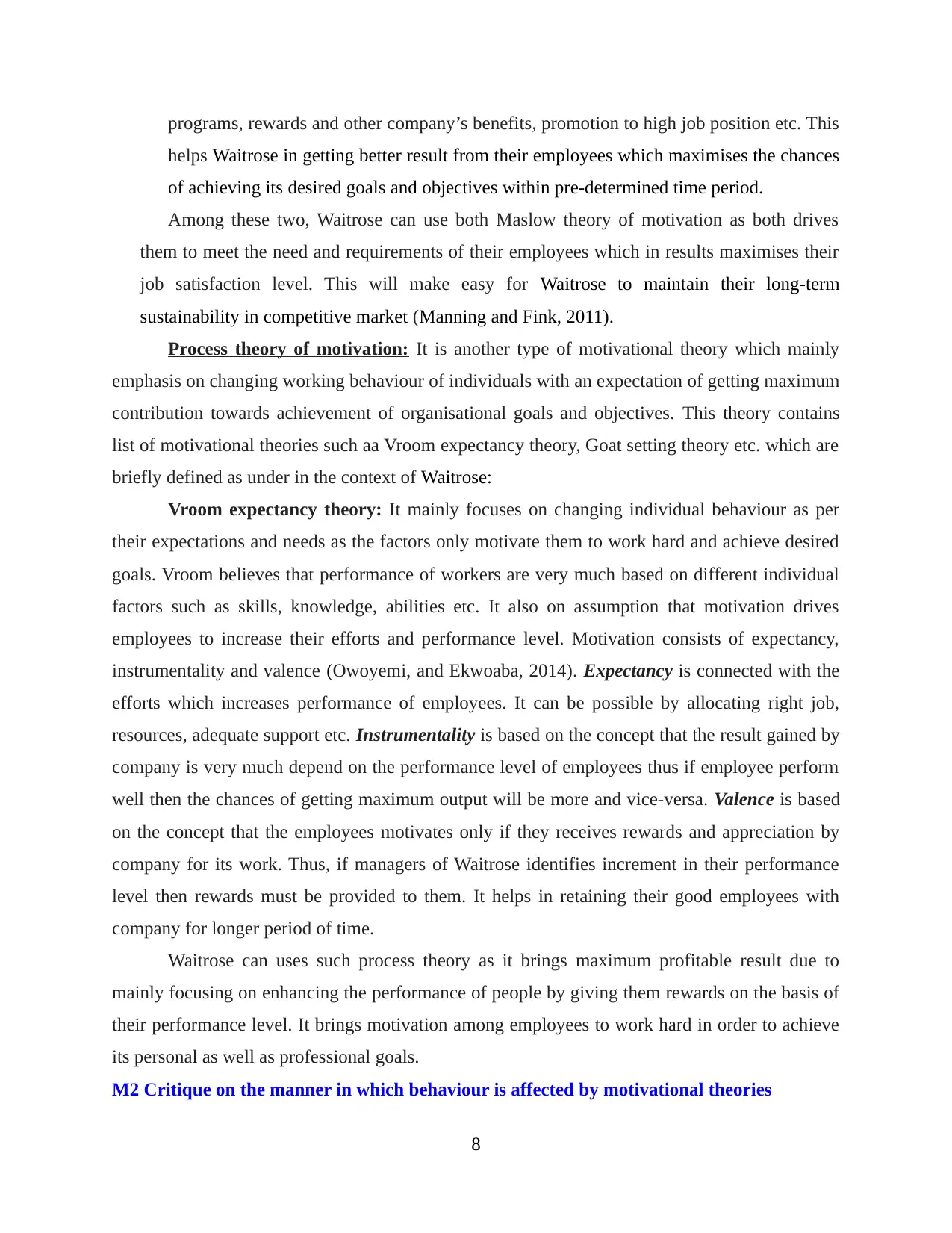
programs, rewards and other company’s benefits, promotion to high job position etc. This
helps Waitrose in getting better result from their employees which maximises the chances
of achieving its desired goals and objectives within pre-determined time period.
Among these two, Waitrose can use both Maslow theory of motivation as both drives
them to meet the need and requirements of their employees which in results maximises their
job satisfaction level. This will make easy for Waitrose to maintain their long-term
sustainability in competitive market (Manning and Fink, 2011).
Process theory of motivation: It is another type of motivational theory which mainly
emphasis on changing working behaviour of individuals with an expectation of getting maximum
contribution towards achievement of organisational goals and objectives. This theory contains
list of motivational theories such aa Vroom expectancy theory, Goat setting theory etc. which are
briefly defined as under in the context of Waitrose:
Vroom expectancy theory: It mainly focuses on changing individual behaviour as per
their expectations and needs as the factors only motivate them to work hard and achieve desired
goals. Vroom believes that performance of workers are very much based on different individual
factors such as skills, knowledge, abilities etc. It also on assumption that motivation drives
employees to increase their efforts and performance level. Motivation consists of expectancy,
instrumentality and valence (Owoyemi, and Ekwoaba, 2014). Expectancy is connected with the
efforts which increases performance of employees. It can be possible by allocating right job,
resources, adequate support etc. Instrumentality is based on the concept that the result gained by
company is very much depend on the performance level of employees thus if employee perform
well then the chances of getting maximum output will be more and vice-versa. Valence is based
on the concept that the employees motivates only if they receives rewards and appreciation by
company for its work. Thus, if managers of Waitrose identifies increment in their performance
level then rewards must be provided to them. It helps in retaining their good employees with
company for longer period of time.
Waitrose can uses such process theory as it brings maximum profitable result due to
mainly focusing on enhancing the performance of people by giving them rewards on the basis of
their performance level. It brings motivation among employees to work hard in order to achieve
its personal as well as professional goals.
M2 Critique on the manner in which behaviour is affected by motivational theories
8
helps Waitrose in getting better result from their employees which maximises the chances
of achieving its desired goals and objectives within pre-determined time period.
Among these two, Waitrose can use both Maslow theory of motivation as both drives
them to meet the need and requirements of their employees which in results maximises their
job satisfaction level. This will make easy for Waitrose to maintain their long-term
sustainability in competitive market (Manning and Fink, 2011).
Process theory of motivation: It is another type of motivational theory which mainly
emphasis on changing working behaviour of individuals with an expectation of getting maximum
contribution towards achievement of organisational goals and objectives. This theory contains
list of motivational theories such aa Vroom expectancy theory, Goat setting theory etc. which are
briefly defined as under in the context of Waitrose:
Vroom expectancy theory: It mainly focuses on changing individual behaviour as per
their expectations and needs as the factors only motivate them to work hard and achieve desired
goals. Vroom believes that performance of workers are very much based on different individual
factors such as skills, knowledge, abilities etc. It also on assumption that motivation drives
employees to increase their efforts and performance level. Motivation consists of expectancy,
instrumentality and valence (Owoyemi, and Ekwoaba, 2014). Expectancy is connected with the
efforts which increases performance of employees. It can be possible by allocating right job,
resources, adequate support etc. Instrumentality is based on the concept that the result gained by
company is very much depend on the performance level of employees thus if employee perform
well then the chances of getting maximum output will be more and vice-versa. Valence is based
on the concept that the employees motivates only if they receives rewards and appreciation by
company for its work. Thus, if managers of Waitrose identifies increment in their performance
level then rewards must be provided to them. It helps in retaining their good employees with
company for longer period of time.
Waitrose can uses such process theory as it brings maximum profitable result due to
mainly focusing on enhancing the performance of people by giving them rewards on the basis of
their performance level. It brings motivation among employees to work hard in order to achieve
its personal as well as professional goals.
M2 Critique on the manner in which behaviour is affected by motivational theories
8
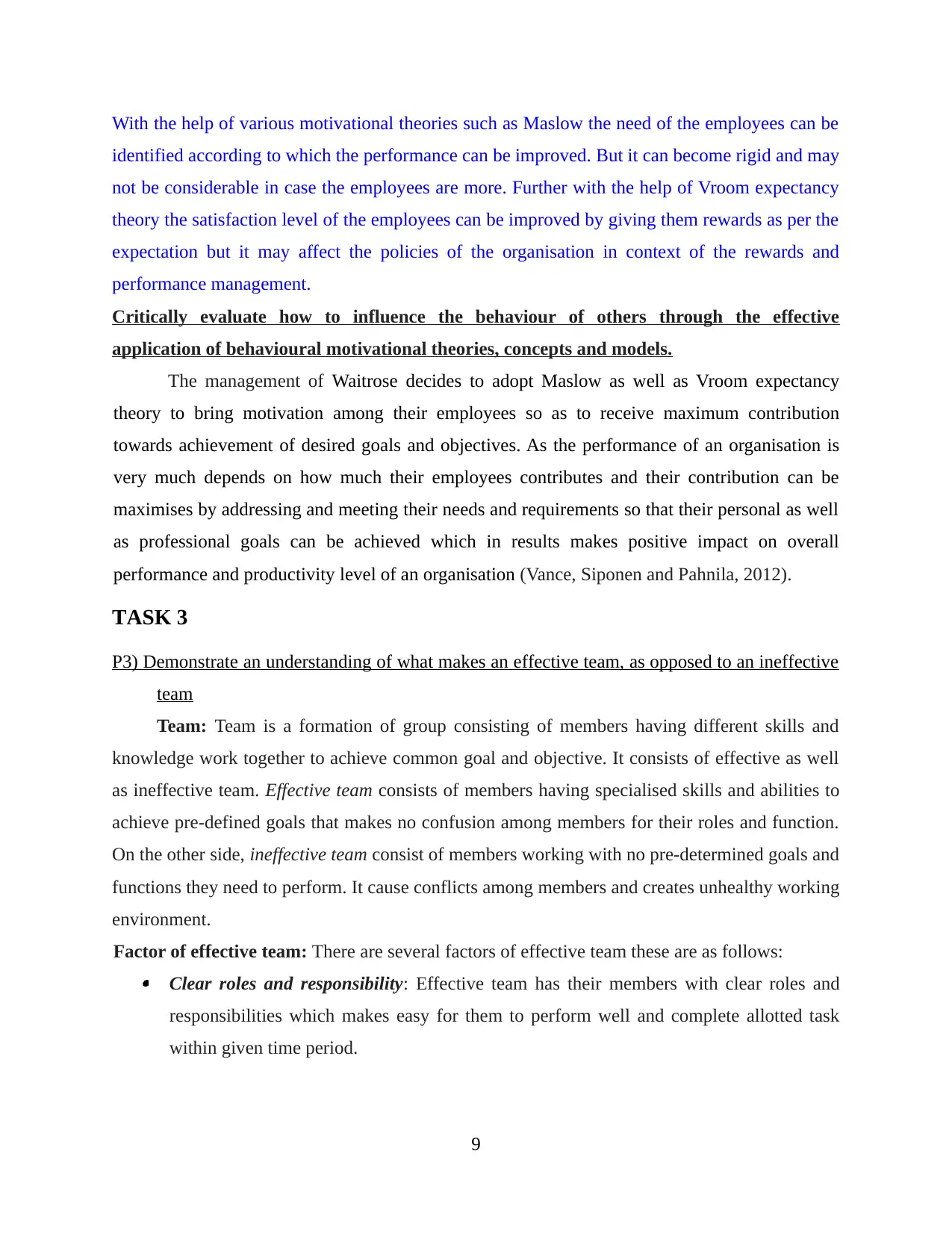
With the help of various motivational theories such as Maslow the need of the employees can be
identified according to which the performance can be improved. But it can become rigid and may
not be considerable in case the employees are more. Further with the help of Vroom expectancy
theory the satisfaction level of the employees can be improved by giving them rewards as per the
expectation but it may affect the policies of the organisation in context of the rewards and
performance management.
Critically evaluate how to influence the behaviour of others through the effective
application of behavioural motivational theories, concepts and models.
The management of Waitrose decides to adopt Maslow as well as Vroom expectancy
theory to bring motivation among their employees so as to receive maximum contribution
towards achievement of desired goals and objectives. As the performance of an organisation is
very much depends on how much their employees contributes and their contribution can be
maximises by addressing and meeting their needs and requirements so that their personal as well
as professional goals can be achieved which in results makes positive impact on overall
performance and productivity level of an organisation (Vance, Siponen and Pahnila, 2012).
TASK 3
P3) Demonstrate an understanding of what makes an effective team, as opposed to an ineffective
team
Team: Team is a formation of group consisting of members having different skills and
knowledge work together to achieve common goal and objective. It consists of effective as well
as ineffective team. Effective team consists of members having specialised skills and abilities to
achieve pre-defined goals that makes no confusion among members for their roles and function.
On the other side, ineffective team consist of members working with no pre-determined goals and
functions they need to perform. It cause conflicts among members and creates unhealthy working
environment.
Factor of effective team: There are several factors of effective team these are as follows: Clear roles and responsibility: Effective team has their members with clear roles and
responsibilities which makes easy for them to perform well and complete allotted task
within given time period.
9
identified according to which the performance can be improved. But it can become rigid and may
not be considerable in case the employees are more. Further with the help of Vroom expectancy
theory the satisfaction level of the employees can be improved by giving them rewards as per the
expectation but it may affect the policies of the organisation in context of the rewards and
performance management.
Critically evaluate how to influence the behaviour of others through the effective
application of behavioural motivational theories, concepts and models.
The management of Waitrose decides to adopt Maslow as well as Vroom expectancy
theory to bring motivation among their employees so as to receive maximum contribution
towards achievement of desired goals and objectives. As the performance of an organisation is
very much depends on how much their employees contributes and their contribution can be
maximises by addressing and meeting their needs and requirements so that their personal as well
as professional goals can be achieved which in results makes positive impact on overall
performance and productivity level of an organisation (Vance, Siponen and Pahnila, 2012).
TASK 3
P3) Demonstrate an understanding of what makes an effective team, as opposed to an ineffective
team
Team: Team is a formation of group consisting of members having different skills and
knowledge work together to achieve common goal and objective. It consists of effective as well
as ineffective team. Effective team consists of members having specialised skills and abilities to
achieve pre-defined goals that makes no confusion among members for their roles and function.
On the other side, ineffective team consist of members working with no pre-determined goals and
functions they need to perform. It cause conflicts among members and creates unhealthy working
environment.
Factor of effective team: There are several factors of effective team these are as follows: Clear roles and responsibility: Effective team has their members with clear roles and
responsibilities which makes easy for them to perform well and complete allotted task
within given time period.
9
⊘ This is a preview!⊘
Do you want full access?
Subscribe today to unlock all pages.

Trusted by 1+ million students worldwide
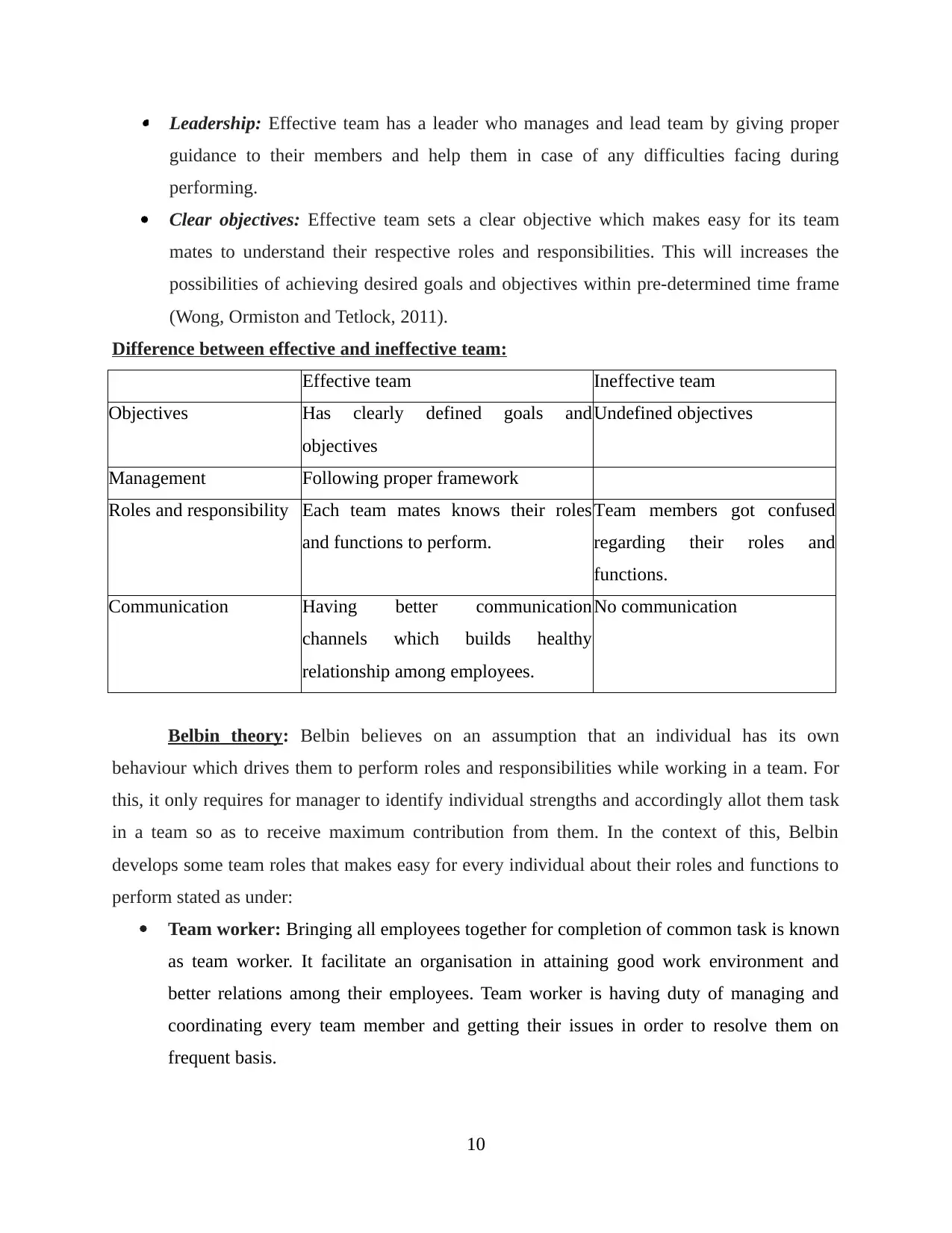
Leadership: Effective team has a leader who manages and lead team by giving proper
guidance to their members and help them in case of any difficulties facing during
performing.
Clear objectives: Effective team sets a clear objective which makes easy for its team
mates to understand their respective roles and responsibilities. This will increases the
possibilities of achieving desired goals and objectives within pre-determined time frame
(Wong, Ormiston and Tetlock, 2011).
Difference between effective and ineffective team:
Effective team Ineffective team
Objectives Has clearly defined goals and
objectives
Undefined objectives
Management Following proper framework
Roles and responsibility Each team mates knows their roles
and functions to perform.
Team members got confused
regarding their roles and
functions.
Communication Having better communication
channels which builds healthy
relationship among employees.
No communication
Belbin theory: Belbin believes on an assumption that an individual has its own
behaviour which drives them to perform roles and responsibilities while working in a team. For
this, it only requires for manager to identify individual strengths and accordingly allot them task
in a team so as to receive maximum contribution from them. In the context of this, Belbin
develops some team roles that makes easy for every individual about their roles and functions to
perform stated as under:
Team worker: Bringing all employees together for completion of common task is known
as team worker. It facilitate an organisation in attaining good work environment and
better relations among their employees. Team worker is having duty of managing and
coordinating every team member and getting their issues in order to resolve them on
frequent basis.
10
guidance to their members and help them in case of any difficulties facing during
performing.
Clear objectives: Effective team sets a clear objective which makes easy for its team
mates to understand their respective roles and responsibilities. This will increases the
possibilities of achieving desired goals and objectives within pre-determined time frame
(Wong, Ormiston and Tetlock, 2011).
Difference between effective and ineffective team:
Effective team Ineffective team
Objectives Has clearly defined goals and
objectives
Undefined objectives
Management Following proper framework
Roles and responsibility Each team mates knows their roles
and functions to perform.
Team members got confused
regarding their roles and
functions.
Communication Having better communication
channels which builds healthy
relationship among employees.
No communication
Belbin theory: Belbin believes on an assumption that an individual has its own
behaviour which drives them to perform roles and responsibilities while working in a team. For
this, it only requires for manager to identify individual strengths and accordingly allot them task
in a team so as to receive maximum contribution from them. In the context of this, Belbin
develops some team roles that makes easy for every individual about their roles and functions to
perform stated as under:
Team worker: Bringing all employees together for completion of common task is known
as team worker. It facilitate an organisation in attaining good work environment and
better relations among their employees. Team worker is having duty of managing and
coordinating every team member and getting their issues in order to resolve them on
frequent basis.
10
Paraphrase This Document
Need a fresh take? Get an instant paraphrase of this document with our AI Paraphraser
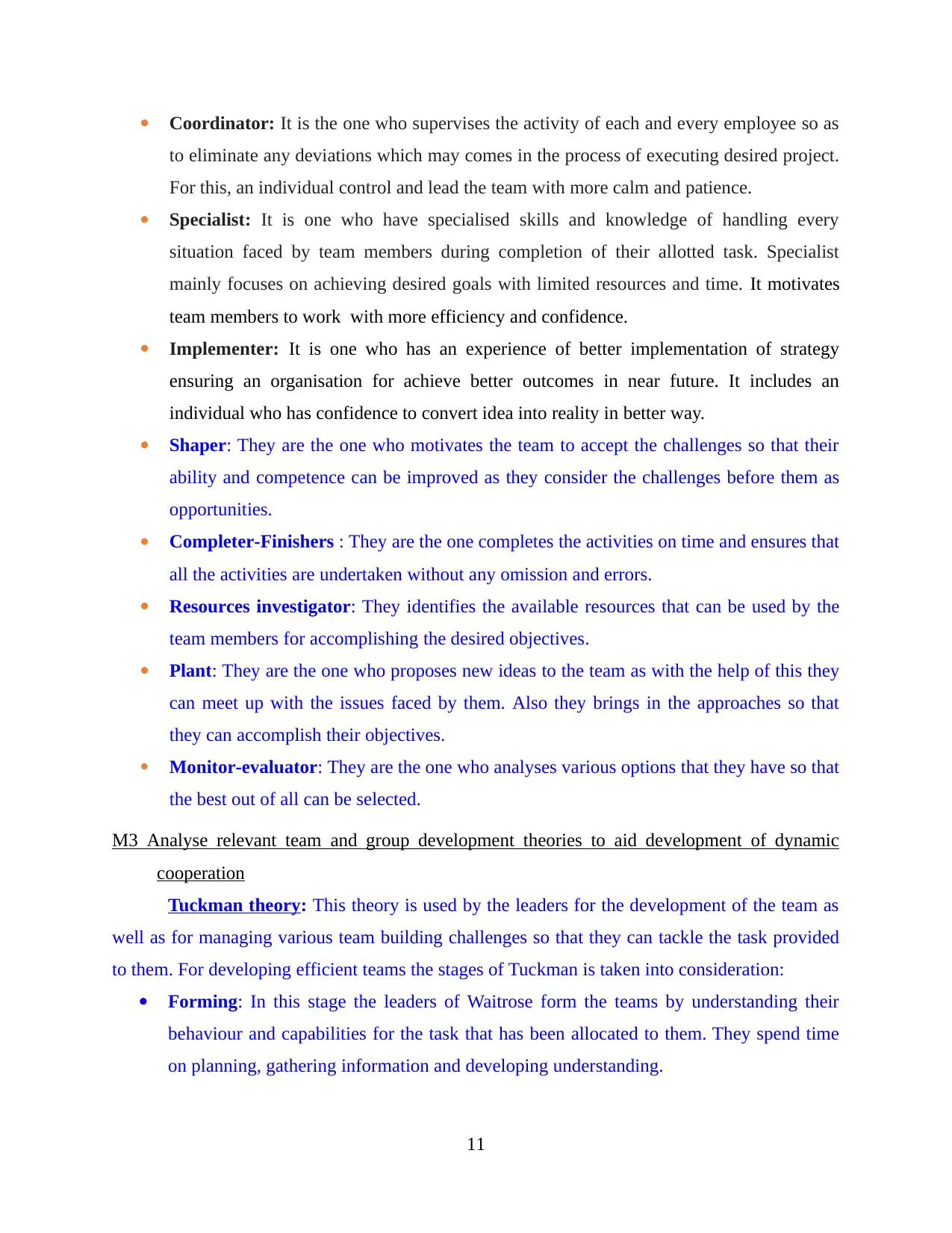
Coordinator: It is the one who supervises the activity of each and every employee so as
to eliminate any deviations which may comes in the process of executing desired project.
For this, an individual control and lead the team with more calm and patience.
Specialist: It is one who have specialised skills and knowledge of handling every
situation faced by team members during completion of their allotted task. Specialist
mainly focuses on achieving desired goals with limited resources and time. It motivates
team members to work with more efficiency and confidence.
Implementer: It is one who has an experience of better implementation of strategy
ensuring an organisation for achieve better outcomes in near future. It includes an
individual who has confidence to convert idea into reality in better way.
Shaper: They are the one who motivates the team to accept the challenges so that their
ability and competence can be improved as they consider the challenges before them as
opportunities.
Completer-Finishers : They are the one completes the activities on time and ensures that
all the activities are undertaken without any omission and errors.
Resources investigator: They identifies the available resources that can be used by the
team members for accomplishing the desired objectives.
Plant: They are the one who proposes new ideas to the team as with the help of this they
can meet up with the issues faced by them. Also they brings in the approaches so that
they can accomplish their objectives.
Monitor-evaluator: They are the one who analyses various options that they have so that
the best out of all can be selected.
M3 Analyse relevant team and group development theories to aid development of dynamic
cooperation
Tuckman theory: This theory is used by the leaders for the development of the team as
well as for managing various team building challenges so that they can tackle the task provided
to them. For developing efficient teams the stages of Tuckman is taken into consideration:
Forming: In this stage the leaders of Waitrose form the teams by understanding their
behaviour and capabilities for the task that has been allocated to them. They spend time
on planning, gathering information and developing understanding.
11
to eliminate any deviations which may comes in the process of executing desired project.
For this, an individual control and lead the team with more calm and patience.
Specialist: It is one who have specialised skills and knowledge of handling every
situation faced by team members during completion of their allotted task. Specialist
mainly focuses on achieving desired goals with limited resources and time. It motivates
team members to work with more efficiency and confidence.
Implementer: It is one who has an experience of better implementation of strategy
ensuring an organisation for achieve better outcomes in near future. It includes an
individual who has confidence to convert idea into reality in better way.
Shaper: They are the one who motivates the team to accept the challenges so that their
ability and competence can be improved as they consider the challenges before them as
opportunities.
Completer-Finishers : They are the one completes the activities on time and ensures that
all the activities are undertaken without any omission and errors.
Resources investigator: They identifies the available resources that can be used by the
team members for accomplishing the desired objectives.
Plant: They are the one who proposes new ideas to the team as with the help of this they
can meet up with the issues faced by them. Also they brings in the approaches so that
they can accomplish their objectives.
Monitor-evaluator: They are the one who analyses various options that they have so that
the best out of all can be selected.
M3 Analyse relevant team and group development theories to aid development of dynamic
cooperation
Tuckman theory: This theory is used by the leaders for the development of the team as
well as for managing various team building challenges so that they can tackle the task provided
to them. For developing efficient teams the stages of Tuckman is taken into consideration:
Forming: In this stage the leaders of Waitrose form the teams by understanding their
behaviour and capabilities for the task that has been allocated to them. They spend time
on planning, gathering information and developing understanding.
11
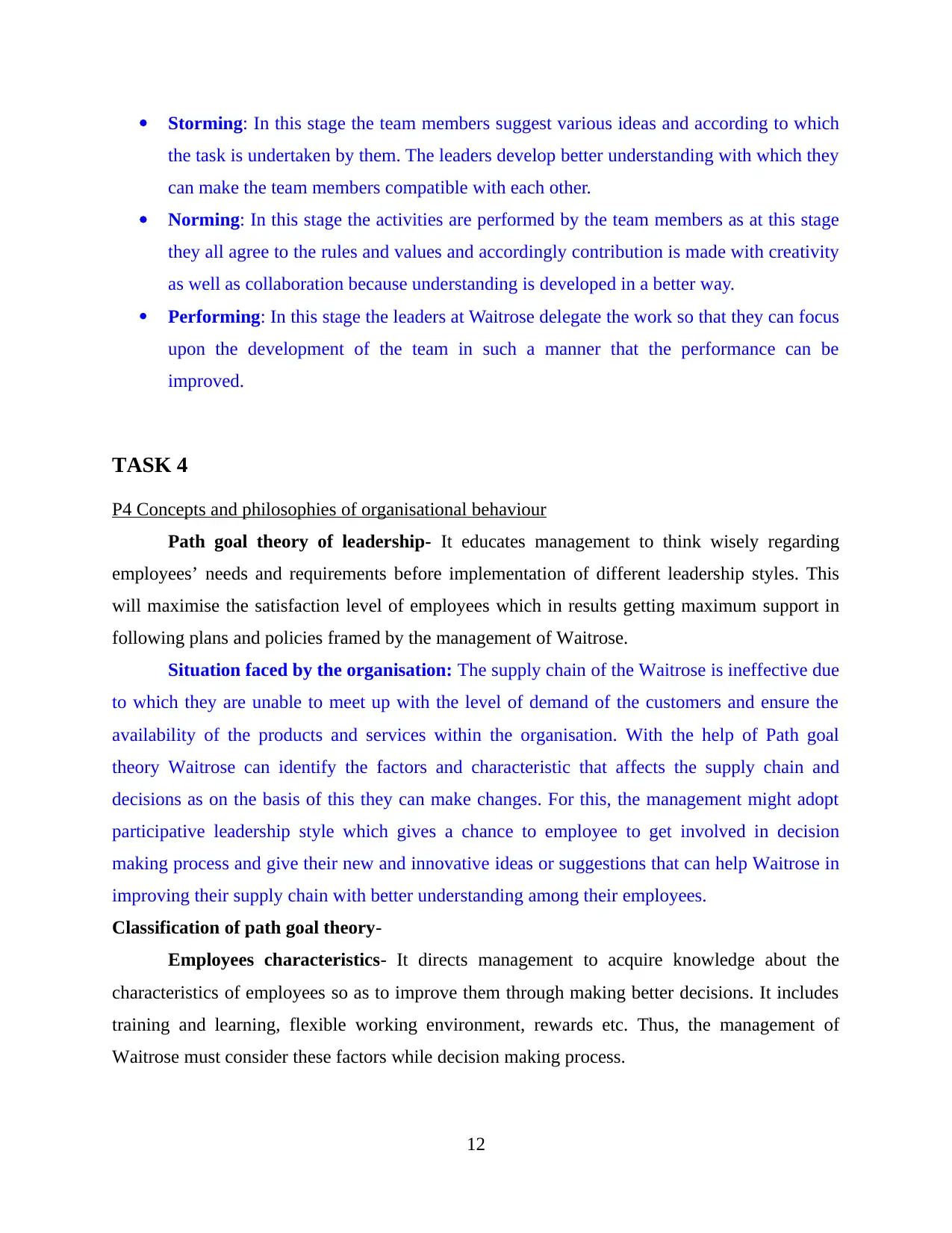
Storming: In this stage the team members suggest various ideas and according to which
the task is undertaken by them. The leaders develop better understanding with which they
can make the team members compatible with each other.
Norming: In this stage the activities are performed by the team members as at this stage
they all agree to the rules and values and accordingly contribution is made with creativity
as well as collaboration because understanding is developed in a better way.
Performing: In this stage the leaders at Waitrose delegate the work so that they can focus
upon the development of the team in such a manner that the performance can be
improved.
TASK 4
P4 Concepts and philosophies of organisational behaviour
Path goal theory of leadership- It educates management to think wisely regarding
employees’ needs and requirements before implementation of different leadership styles. This
will maximise the satisfaction level of employees which in results getting maximum support in
following plans and policies framed by the management of Waitrose.
Situation faced by the organisation: The supply chain of the Waitrose is ineffective due
to which they are unable to meet up with the level of demand of the customers and ensure the
availability of the products and services within the organisation. With the help of Path goal
theory Waitrose can identify the factors and characteristic that affects the supply chain and
decisions as on the basis of this they can make changes. For this, the management might adopt
participative leadership style which gives a chance to employee to get involved in decision
making process and give their new and innovative ideas or suggestions that can help Waitrose in
improving their supply chain with better understanding among their employees.
Classification of path goal theory-
Employees characteristics- It directs management to acquire knowledge about the
characteristics of employees so as to improve them through making better decisions. It includes
training and learning, flexible working environment, rewards etc. Thus, the management of
Waitrose must consider these factors while decision making process.
12
the task is undertaken by them. The leaders develop better understanding with which they
can make the team members compatible with each other.
Norming: In this stage the activities are performed by the team members as at this stage
they all agree to the rules and values and accordingly contribution is made with creativity
as well as collaboration because understanding is developed in a better way.
Performing: In this stage the leaders at Waitrose delegate the work so that they can focus
upon the development of the team in such a manner that the performance can be
improved.
TASK 4
P4 Concepts and philosophies of organisational behaviour
Path goal theory of leadership- It educates management to think wisely regarding
employees’ needs and requirements before implementation of different leadership styles. This
will maximise the satisfaction level of employees which in results getting maximum support in
following plans and policies framed by the management of Waitrose.
Situation faced by the organisation: The supply chain of the Waitrose is ineffective due
to which they are unable to meet up with the level of demand of the customers and ensure the
availability of the products and services within the organisation. With the help of Path goal
theory Waitrose can identify the factors and characteristic that affects the supply chain and
decisions as on the basis of this they can make changes. For this, the management might adopt
participative leadership style which gives a chance to employee to get involved in decision
making process and give their new and innovative ideas or suggestions that can help Waitrose in
improving their supply chain with better understanding among their employees.
Classification of path goal theory-
Employees characteristics- It directs management to acquire knowledge about the
characteristics of employees so as to improve them through making better decisions. It includes
training and learning, flexible working environment, rewards etc. Thus, the management of
Waitrose must consider these factors while decision making process.
12
⊘ This is a preview!⊘
Do you want full access?
Subscribe today to unlock all pages.

Trusted by 1+ million students worldwide
1 out of 16
Related Documents
Your All-in-One AI-Powered Toolkit for Academic Success.
+13062052269
info@desklib.com
Available 24*7 on WhatsApp / Email
![[object Object]](/_next/static/media/star-bottom.7253800d.svg)
Unlock your academic potential
Copyright © 2020–2026 A2Z Services. All Rights Reserved. Developed and managed by ZUCOL.




